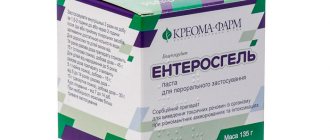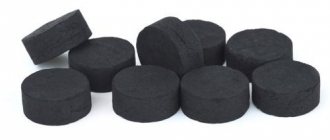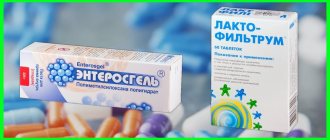Enterosorbents for allergies are drugs aimed at absorbing various types of toxins. The pharmaceutical product reliably removes allergens and the results of nutrient breakdown. In the acute allergic phase, the substance is indispensable for stopping dangerous symptoms. A set of preventive measures using enterosorbents prevents the development of relapses.
Mechanism of action of sorbents
Due to the disruption of the barrier function in the patient’s body, he is unable to cope with foreign proteins on his own. For this reason, antigens are activated with their increased release. As a result, the excretion of active substances such as serotonin, histamine and acetylcholine is enhanced.
These substances accumulate in the body, causing a toxic reaction called endotoxemia. Endotoxicosis provokes tissue oxygen starvation, impaired metabolism, and malfunction of the kidneys and liver.
Due to the mechanism of pathogenesis, sorbents are recommended to be used from the very beginning of allergy disease.
Sorbents have a therapeutic effect due to the active absorption of allergens from the gastrointestinal tract and their subsequent removal from the body. In addition, they prevent the reabsorption of metabolic products.
What happens to the body during an allergic disease?
An allergen entering the human body causes unpleasant consequences. Why? Because it provokes increased synthesis of immunoglobulin E (that is, an antibody to the allergic compound is formed). Gradually, immunoglobulin E (antibodies) becomes more and more in the blood and it comes into contact with the allergic substance. A complex is formed consisting of an antibody and an antigen, which causes the destruction of mast blood cells.
When mast cells are destroyed, acetylcholine, histamine and serotonin enter the bloodstream. That is, those substances enter the blood that increase the permeability of cell membranes, causing swelling, itching, redness of the skin, and, in fact, provoke poisoning of the human body. The fact that there are many biologically active substances in the blood, poisoning a person from the inside, is called endotoxicosis in medicine. This condition is characterized by the following symptoms:
- metabolic disease;
- the occurrence of renal and liver failure;
- violation of tissue microcirculation.
The sorbent for allergies must be used from the first days of the development of the disease, otherwise the consequences may be irreversible.
Indications for use
Sorbents can be prescribed in the following cases:
- reduced functional load on organs that perform detoxification of the liver, kidneys, etc.;
- correction of dysbacteriosis, stimulation of regeneration processes;
- atopic dermatitis, urticaria;
- allergic reactions of any type;
- acquired foci of infections, diseases of the liver, bile ducts;
- bronchial asthma, metabolic disorders.
In addition, the drugs are effective in unfavorable environmental conditions.
Contraindications
Like all medications, sorbents are contraindicated for the following symptoms:
- development of erosive gastritis;
- peptic ulcer of the stomach, as well as duodenal ulcer;
- intestinal atony with decreased peristalsis;
- frequent constipation. When prescribing enterosorbents, the patient needs to remember that it is important to drink at least 2 liters of fluid per day, as well as eat fiber contained in vegetables and fruits. This will help get rid of constipation.
Additionally, when treating allergies, vitamin prophylaxis may be prescribed. Sorbents should be taken at the first symptoms of the disease.
How to choose
Pharmaceutical companies offer a variety of sorbents with different compositions and release forms (from standard tablets to powders and capsules). Medicines can be bought without a prescription at a pharmacy or ordered online.
The first thing you need to pay attention to when choosing a sorbent is its composition. Typically, medications of this type contain simple components of natural or synthetic origin, which are safe and rarely cause food allergies.
Depending on the active substance, medications have either a mild effect, without causing a serious effect on the mucous membranes, or an aggressive effect (up to microtrauma).
How not to make a mistake when choosing:
- Select a medicine based on the existing symptoms, indications for use, release form (affects how quickly the medicine acts). For example, suspensions and powders act much faster than tablets.
- Consider contraindications for use. Some sorbents should not be taken by pregnant women or those with diabetes.
- Ease of use. Pay attention to the information about how many times a day you need to take the medicine and at what time.
- Interaction with other drugs - some sorbents may reduce the effect of other drugs.
- The specifics of the disease - for example, the effect of activated carbon on the mucous membranes of the inflamed intestine is comparable in effect to sandpaper. Therefore, when selecting, it is worth considering not only the effectiveness, but also the composition.
- Age restrictions are especially important when choosing sorbents for young children. Be sure to follow the dosage (usually indicated based not only on age, but also on weight).
It is also worth considering that long-term use of some sorbents can impair the absorption of vitamins and microelements, so multivitamin preparations are additionally prescribed.
The main thing is that in case of serious poisoning you should not self-medicate; it is better to call a doctor.
Recommended sorbents for allergies
- Activated carbon, Anthralen;
- Enterosgel, Karbolong;
- Sorbex, Multisorb;
- Carbolene, Sorbolong, Atoxyl.
In addition, it is permissible to use biological additives with similar properties, which include cellulose tablets and extralact.
The duration of treatment depends on the general condition of the patient and the presence of concomitant diseases.
Classification
Sorbents can be classified according to several indicators:
- dosage form - The drug is available in tablets, granules, powders, suspensions, capsules;
- chemical composition - sorbents can be represented by silica gel, dietary fiber, aluminum gel, inorganic sorbents, mixed types of medicines, zeolites;
- sorption – represented by an ion exchange process that acts in a complex manner and has catalytic properties;
- selectivity – there are three types of adsorbents: polyfunctional, biselective, non-selective. A specific type of medication is prescribed to the patient based on a specific situation.
Types and properties of sorbents
There are several types of drugs that differ in their chemical reaction when interacting with toxins:
- absorbents can convert harmful substances into a liquid or solid state
- adsorbents, thanks to their divided surface, can absorb toxins
- chemical scavengers that neutralize a substance by reacting with it
Sorbents can be classified according to their composition:
- hard
- fibrous
In addition to the listed properties, sorbents have:
- toxicity indicator
- degree of compatibility with body tissues
- indicator of a negative effect on the gastrointestinal mucosa
For medications that reduce the manifestation of allergies, the ability to absorb various biological and chemical substances that enter the human body is important.
Instructions
Sorbents for allergies are recommended to be used in the first few hours after the development of allergic symptoms.
- The dose of the drug directly depends on the patient’s body weight and is calculated in a ratio of 0.2 g. up to 1 gr. per kilogram of weight. This formula is intended to be taken daily, divided into several doses (3-4) during this time;
- The duration of the treatment course to relieve allergy symptoms can be up to a week. However, if necessary, it can be extended to 14 days;
- in the last two days of using sorbents, their amount should be gradually reduced, reducing it by half from the original;
- in case of acute allergic symptoms, accompanied by unbearable itching, hyperemia of the skin with peeling, an increased dose of sorbents is used. This allows you to quickly neutralize the symptoms of the disease and stop various complications;
- The calculation of the loading dose is carried out according to a similar scheme, but there is one condition: the duration of application of the loading dosage should not exceed three days. After this, the drugs are used in the usual therapeutic dosage.
It is important to note that sorbents are very often used as prophylactic agents to prevent the development of allergies. This use helps to lengthen the time of remission.
For preventive purposes, the sorbent is taken according to the following principle:
- You need to take the medicine 2 hours after eating;
- The drug should be taken in the morning and evening;
- the calculation is made in the ratio of 0.2-0.5 grams per kg of patient weight;
- The full dose must be taken once a day;
- prophylaxis lasts from 7 to 10 days.
A course of prevention for allergy sufferers is carried out at least once a month - in the first three months after an exacerbation. Subsequently, prophylaxis is carried out at least once every 3 months.
The total duration of preventive therapy can be up to one year, but the frequency of use of the drug depends on the complexity of the pathological course, as well as concomitant diseases.
Despite the fairly rare complications when using enterosorbents, there are patients who have increased sensitivity to the components of the drug. Therefore, self-treatment is strictly prohibited. Particular care and attention should be paid to treatment with these drugs in childhood.
Reviews
Currently, there is a wide range of such drugs, but they should be chosen carefully. Many patients who actively use sorbents to treat allergies and other diseases note that their prolonged use can lead to hypovitaminosis. In addition, there is frequent constipation, as well as disturbances in the functioning of the digestive system.
The most positive reviews relate to the use of Enterosgel and Lactofiltrum. While taking sorbents, patients are forced to use laxative rectal suppositories. Their action mitigates the side effects of sorbents. Suppositories are approved for use during pregnancy and breastfeeding. Enterosorbents have shown good effectiveness in removing toxins in childhood.
Patients note that to relieve allergic symptoms, sorbents are best used in complex treatment. In order for the stool to normalize, doctors recommend drinking a large amount of fluid: at least 1.5 liters of clean drinking water, not counting other liquids.
Important! Any medications can cause rejection by the body. The development of such a reaction to the intake of sorbents cannot be ruled out. Therefore, independent use of drugs, increasing or decreasing the prescribed dosage, is strictly prohibited. Any medications can only be prescribed by a highly qualified specialist, based on the general condition of the patient.
Chemical absorbents
Medichronal
A combined drug that helps reduce the accumulation in the body of one of the most toxic breakdown products of alcohol, acetaldehyde. Relieves symptoms of alcohol intoxication (in an average of 20-30 minutes, regardless of severity), has a slight calming effect. It also normalizes well-being and sleep.
The active ingredients are sodium formate, glucose monohydrate and glycine. Release form: powder (two per dose) in a cardboard box. Before use, the contents of both packages are dissolved in water (any non-carbonated drinks - juice, for example).
The drug is usually well tolerated; in rare cases, side effects such as headache, irritability, and poor concentration may occur.
Medichronal can be used in the treatment of alcoholism (compatible with any methods), and also as an independent means to prevent binge drinking. Contraindications: severe forms of diabetes, pregnancy. Most buyers appreciated the effectiveness and quick action of the drug.
Medichronal
Advantages:
- eliminates hangover symptoms (prevention of binge drinking);
- improves metabolism;
- indicated for the treatment (as an adjuvant) and prevention of alcoholism;
- minimum contraindications;
- convenient release format.
Flaws:
- price.
Diazolin
With the active ingredient mebhydrolin. Indicated for allergic rhinitis, conjunctivitis, asthma (in complex therapy), eczema, relieves itching after insect bites. It has an antihistamine, antiexudative effect, and has a mild sedative effect. It enhances the effect of ethanol, so alcohol should be avoided during treatment with the drug.
Diazolin
Advantages:
- price-effectiveness ratio;
- can be used for prevention.
Flaws:
- not suitable for the treatment of severe allergic reactions;
- contraindicated for gastrointestinal diseases, epilepsy, glaucoma;
- should not be taken by pregnant, nursing mothers, or children under 10 years of age;
- side effects - dizziness, drowsiness.











